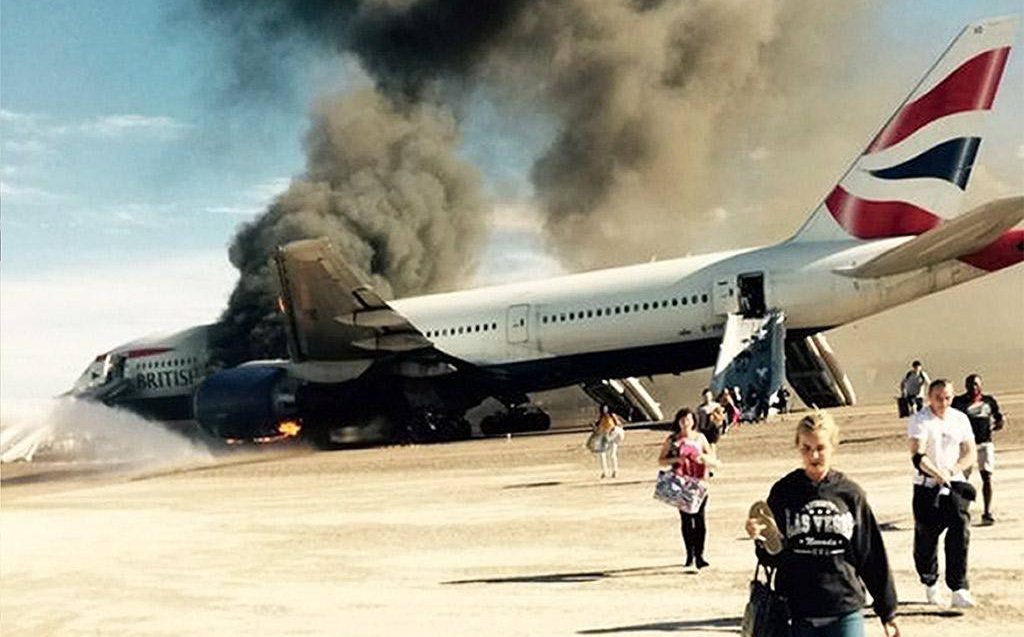
A new report by a prestigious aviation society has suggested that the overhead bins in aircraft cabins could be fitted with remote controlled locks to prevent passengers attempting to take their personal possessions with them in an emergency evacuation. The recommendation was made by the Royal Aeronautical Society, which was established way back in 1866 and is credited as being “the worlds only professional body dedicated to the aerospace community.”
The specialist paper, ‘Emergency Evacuation of Commercial Passenger Aeroplanes’ examines a total of 14 recent aviation accidents in which passengers have been forced to evacuate. The paper, authored by experts from the Flight Operations Group of the RAeS, looks at what lessons can be learned from previous evacuations to make flying even safer.
Of particular interest, is the paper’s focus on the issue of passenger luggage. A number of recent evacuations – including Emirates EK521 in August 2016, British Airways BA2276 in September 2015 and most recently, American Airlines flight AA383 – has seen large numbers of passengers take their carry-on luggage with them during the evacuation.
American Airlines even went so far as to call out passengers who took their luggage in the October 2016 incident for potentially delaying the evacuation. The Captain of the Boeing 767 had to abort takeoff at Chicago O’Hare after an engine caught fire as the aircraft was hurtling along the runway. Luckily, everyone managed to escape with only minor injuries reported.
But American says passengers scrambling for their personal belongings could well have delayed the evacuation and taking luggage with them on the emergency escape chutes may have caused a puncture. The airline has called on Federal authorities to clamp down on the behaviour – with possible criminal charges even being muted.
Remotely-locked overhead bins?
The RAeS, however, says the issue of personal belongings hindering an evacuation might be a problem that’s only going to get worse. Aircraft manufacturers are designing next-generation overheads bins which can store more cags than ever before, while airlines rollout ‘hand luggage only’ fares for thrifty travellers.
“It would appear that cabin crew have little control over passengers who insist on taking cabin baggage with them in an evacuation,” the paper says.
“Perhaps it is only a matter of time before an evacuation occurs when the issue of cabin baggage becomes a survival factor.”
Noting that a Russian-made passenger aircraft is already marketed with optional remotely-locked overhead bins, the paper says aviation authorities should consider looking into the feasibility of such devices to keep overhead bins (save for ones containing emergency equipment) locked during taxi, takeoff and landing.
British Airways Flight BA2276
On September 8th, 2015 a British Airways 777-200 was taking off from Las Vegas Maccaran Airport bound for London Gatwick when the left engine suffered an uncontained failure. The aircraft stopped on the runway as a large fire engulfed the left engine.
All 157 passengers onboard, as well as the 13 crew members, managed to evacuate the aircraft in 2 minutes and 32 seconds. One member of cabin crew sustained a serious injury and 19 passengers sustained minor injuries.
The crew managed to evacuate the aircraft quickly despite more than 50% of the exits being unusable due to various issues. However, a number of passengers were criticised after photos emerged of them lugging suitcases across the runway.
Should families be charged to sit together?
The report also looks at how charging for seat assignments could affect an emergency evacuation, noting that having family members separated from one another could “have a serious impact on passenger flow to emergency exits.”
Drawing on recommendations from the UK’s Civil Aviation Authority, the report says airlines should not charge family members to sit together – saying that the assistance of an adult is of “paramount importance” during an evacuation as well as decompression or air turbulence.
Who can authorise an evacuation?
Another cause of concern for the authors was the issue of who can give the command to evacuate an aircraft. Normally, it’s only the aircraft Captain that can authorise an evacuation but some airlines do allow their cabin crew to make that call.
While this is sometimes needed – especially when contact with the pilots is impossible, the report suggests authority should always rest with the Captain unless an “obvious catastrophic and life-threatening event occurs.” Clearly, making the call to evacuate is a big one and is very much a case of balancing the various dangers involved.
The Royal Aeronautical Society doesn’t actually have any regulatory authority but its likely that aviation authorities around the world will be reading the recommendations with interest. The idea of remotely locking overhead bins once seemed fantastical – but it’s an idea that may well now be taken seriously.
Mateusz Maszczynski honed his skills as an international flight attendant at the most prominent airline in the Middle East and has been flying ever since... most recently for a well known European airline. Matt is passionate about the aviation industry and has become an expert in passenger experience and human-centric stories. Always keeping an ear close to the ground, Matt's industry insights, analysis and news coverage is frequently relied upon by some of the biggest names in journalism.







